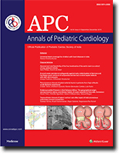
Annals of Pediatric Cardiology
Scope & Guideline
Bridging Cardiology and Pediatrics for a Healthier Future
Introduction
Aims and Scopes
- Congenital Heart Disease Management:
The journal extensively covers various aspects of congenital heart diseases, including surgical techniques, catheter-based interventions, and long-term outcomes. It emphasizes innovative approaches to treatment and management, aiming to enhance survival and quality of life for affected children. - Pediatric Cardiac Imaging Techniques:
Research on advanced imaging modalities, such as echocardiography and MRI, plays a crucial role in the journal's scope. It highlights the importance of accurate diagnostics and monitoring of cardiac function and structure in the pediatric population. - Arrhythmias and Electrophysiology:
The journal features studies on pediatric arrhythmias, including their diagnosis, management, and outcomes. This includes research on electrophysiological studies, catheter ablation techniques, and the use of devices for rhythm management. - Impact of Systemic Conditions on Cardiac Health:
There is a growing emphasis on the intersection of systemic conditions, such as COVID-19 and multisystem inflammatory syndrome, and their effects on pediatric cardiac health. The journal explores the implications of these systemic diseases on heart function and management. - Health Economics and Access to Care:
The journal addresses healthcare access and economic factors in pediatric cardiology, particularly in low- and middle-income countries. It discusses the challenges and solutions related to the cost of care and resource allocation in pediatric cardiac services.
Trending and Emerging
- Telemedicine and Remote Monitoring:
The COVID-19 pandemic has accelerated the adoption of telemedicine in pediatric cardiology. The journal is increasingly publishing studies that explore the efficacy and patient satisfaction associated with remote consultations and monitoring of cardiac conditions. - Genetic and Molecular Insights into Cardiovascular Diseases:
Research into the genetic basis of congenital heart diseases is gaining traction. The journal features studies examining genetic testing and the role of specific gene variants in pediatric cardiology, aiming to personalize treatment approaches. - Long-Term Outcomes of Pediatric Cardiac Interventions:
There is a growing emphasis on studies that assess long-term outcomes following pediatric cardiac interventions. This includes the evaluation of late complications and quality of life in patients who have undergone surgical or catheter-based therapies. - Multisystem Inflammatory Syndrome and Cardiac Implications:
The journal is increasingly focusing on the cardiac implications of multisystem inflammatory syndrome in children, particularly in the context of COVID-19. This emerging theme highlights the need for comprehensive cardiovascular assessments in affected children. - Health Disparities and Global Health in Pediatric Cardiology:
Research addressing health disparities in access to pediatric cardiac care, particularly in low- and middle-income countries, is becoming more prevalent. The journal is showcasing studies that explore systemic barriers and propose solutions to improve cardiac care equity.
Declining or Waning
- Traditional Surgical Techniques:
With the rise of minimally invasive and catheter-based interventions, traditional open-heart surgical techniques are receiving less emphasis in the journal. The focus has shifted towards less invasive approaches that offer quicker recovery and fewer complications. - Basic Science Research:
There seems to be a declining trend in basic science research related to pediatric cardiology. The journal is increasingly prioritizing clinical studies and translational research that have immediate implications for patient care. - Longitudinal Studies on Rare Congenital Anomalies:
While still important, there appears to be a decrease in the publication of longitudinal studies specifically targeting rare congenital anomalies. This shift may be due to the increasing complexity of such studies and the need for larger collaborative research efforts. - Focus on Single-Center Studies:
There is a noticeable decline in the publication of single-center studies. The journal is favoring multicenter collaborations that provide broader insights and more generalizable findings across diverse patient populations.
Similar Journals

HEART AND VESSELS
Fostering Knowledge for a Stronger Cardiovascular FutureHEART AND VESSELS is a prominent peer-reviewed journal published by SPRINGER, dedicated to advancing the fields of cardiology and cardiovascular medicine. With its ISSN 0910-8327 and E-ISSN 1615-2573, this esteemed journal encompasses a broad range of topics pertinent to heart health, vascular function, and associated therapies, making it an essential resource for researchers, clinicians, and healthcare professionals alike. Based in Japan and operating since 1985, HEART AND VESSELS has consistently maintained a Q2 ranking in the 2023 category quartiles, highlighting its relevance and impact in the cardio domain. Although it does not offer open access, the journal ensures high-quality publications that contribute significantly to the academic and clinical understanding of cardiovascular health. With over three decades of continuous scholarly contribution, HEART AND VESSELS serves as a vital platform for disseminating cutting-edge research and fostering innovative practices in the management of cardiovascular diseases.

Heart Rhythm O2
Empowering the global medical community with vital knowledge.Heart Rhythm O2, published by Elsevier and indexed under ISSN 2666-5018, is a premier Open Access journal that has established itself as a vital platform for the dissemination of innovative research in Cardiology and Cardiovascular Medicine. Since its inception in 2020, this journal has rapidly gained recognition, achieving a distinguished Q1 ranking in its field as of 2023, underscoring its commitment to excellence and quality. Operating from its base in the Netherlands, Heart Rhythm O2 aims to bridge the gap between clinical practice and emerging scientific findings, fostering collaboration among researchers, healthcare professionals, and students globally. With a focus on high-impact original research, review articles, and clinical studies, the journal is dedicated to advancing our understanding of cardiac rhythm management and cardiovascular health. With open access options, it ensures that vital knowledge is freely available, facilitating the ongoing education and engagement of the medical community worldwide.
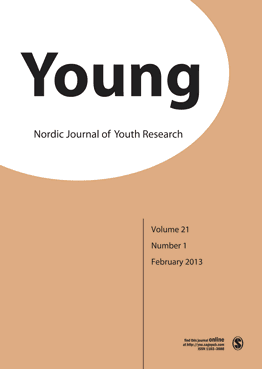
Young
Illuminating the path of developmental psychology and health.Young, published by SAGE Publications Ltd, is a distinguished academic journal that plays a pivotal role in the fields of Developmental and Educational Psychology, Health (social science), and Sociology and Political Science. With an ISSN of 1103-3088 and an E-ISSN of 1741-3222, the journal has established itself as a vital resource for researchers and practitioners since its inception in 1993. As of 2023, it boasts impressive rankings, holding a Q1 designation in both Health (social science) and Sociology and Political Science, and a Q2 in Developmental and Educational Psychology, reflecting its high impact and relevance in contemporary scholarly discourse. While the journal does not currently offer open access options, it remains a key platform for disseminating innovative research that addresses critical societal issues. With its headquarters in the United States and a strong international presence, Young continues to foster the advancement of knowledge and practice in its respective fields, making it essential reading for anyone passionate about the intersection of research, policy, and education.

Research in Cardiovascular Medicine
Empowering research to transform cardiovascular care.Research in Cardiovascular Medicine is a renowned open-access journal published by Wolters Kluwer Medknow Publications, dedicated to advancing knowledge in the swiftly evolving field of cardiovascular health. With an ISSN of 2251-9572 and E-ISSN of 2251-9580, this journal serves as a vital platform for researchers and professionals to share their findings, explore innovative treatments, and discuss current trends in cardiovascular care. Since transitioning to open access in 2013, it has democratized access to high-quality research, ensuring that vital information reaches healthcare practitioners and academia alike. The journal’s commitment to rigorous peer review and its emphasis on cutting-edge research contribute significantly to improving patient outcomes and addressing the global burden of cardiovascular diseases. By publishing original articles, review papers, and clinical studies, Research in Cardiovascular Medicine plays a crucial role in shaping the future of cardiovascular research and education, appealing to a wide audience of researchers, professionals, and students striving to make meaningful contributions to this critical field.
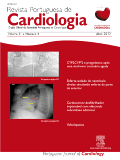
Revista Portuguesa de Cardiologia
Empowering the fight against heart disease through open access research.Revista Portuguesa de Cardiologia, published by Elsevier España SLU, stands as a pivotal resource in the realm of Cardiology and Cardiovascular Medicine. With its origins tracing back to 1970, this journal has cultivated a robust academic presence, achieving a 2023 Q3 ranking in its category, and currently holding a position of #220 out of 387 on the Scopus rankings, placing it within the 43rd percentile of its field. This open access journal, available since 2011, aims to disseminate high-quality research and insights relevant to contemporary cardiovascular issues. Its commitment to accessibility and knowledge exchange enhances its importance for clinicians, researchers, and students alike, fostering a more informed community in the fight against cardiovascular diseases. Operating from its base in Barcelona, Spain, the journal welcomes contributions that further the understanding and treatment of heart conditions, contributing significantly to the advancement of cardiovascular health.

Nepalese Heart Journal
Connecting Researchers and Clinicians for a Healthier FutureNepalese Heart Journal, published by the CARDIAC SOC NEPAL, serves as a premier platform for disseminating knowledge in the field of cardiology and cardiovascular health. With an ISSN of 2091-2978, this journal aims to bridge the gap between researchers, clinicians, and academicians by presenting high-quality, peer-reviewed articles that address clinical practices, innovative research, and emerging trends in heart disease management, especially within the context of Nepal and the surrounding region. Although it operates under a traditional publishing model, its commitment to excellence aids in reinforcing the scientific discourse in an area critical to public health. The journal is a valuable resource for professionals and students alike who are focused on advancing their understanding of cardiology and its implications for health policy and practice. Exploring the intersections of local challenges and global advancements in heart health, the Nepalese Heart Journal is poised to contribute meaningfully to the evolving landscape of cardiovascular research.

Revista de la Federacion Argentina de Cardiologia
Shaping the future of cardiovascular medicine with every publication.Revista de la Federacion Argentina de Cardiologia is a vital publication in the field of Cardiology and Cardiovascular Medicine, providing a platform for researchers and healthcare professionals to share significant findings and innovative concepts since its inception in 2012. Published by the Federacion Argentina Cardiology, this journal specifically addresses contemporary issues and advancements within cardiology, contributing to the scholarly dialogue essential for improving cardiovascular health. Despite being categorized in the Q4 quartile for 2023 and presently ranking #358 out of 387 in its field, the journal remains committed to fostering academic inquiry and disseminating valuable research for both local and global audiences. Although it is not an open-access journal, it strives to balance accessibility with rigorous academic standards, ensuring quality contributions that are critical for practitioners and students alike. The journal’s ongoing evaluation and adaptation in the ever-evolving landscape of cardiology underscore its importance in advancing cardiovascular science and practice.
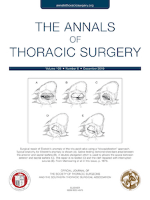
ANNALS OF THORACIC SURGERY
Innovating the future of cardiology and pulmonary medicine.ANNALS OF THORACIC SURGERY, published by Elsevier Science Inc, is a premier journal that has been serving the fields of cardiology, pulmonary medicine, and surgery since its inception in 1965. With an esteemed Q1 ranking in both Cardiology and Cardiovascular Medicine, as well as in Pulmonary and Respiratory Medicine for 2023, this journal is recognized for its rigorous peer-reviewed articles that contribute significantly to advancing surgical practices and outcomes. The journal boasts impressive Scopus rankings, placing it in the 93rd percentile for Surgery and ensuring it remains a key resource for professionals, researchers, and students. While primarily a subscription-based publication, it provides invaluable insights and original research that drive innovation and improve patient care. For those involved in thoracic surgery, this journal is indispensable, offering a platform for critical developments and collaborative discourse in the field.
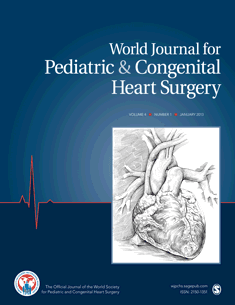
World Journal for Pediatric and Congenital Heart Surgery
Innovating Solutions for Congenital Heart ChallengesThe World Journal for Pediatric and Congenital Heart Surgery, published by SAGE Publications Inc, is an authoritative resource dedicated to advancing the field of pediatric and congenital heart surgery. Since its inception in 2010, this journal has carved a niche for itself in the realms of pediatrics, cardiology, and surgery, with impressive quartile rankings reflecting its growing influence: Q2 in Pediatrics, Perinatology and Child Health, and Q2 in Surgery, alongside Q3 placements in Cardiology and Cardiovascular Medicine. This journal, which holds the ISSN 2150-1351 and E-ISSN 2150-0136, serves as a vital platform for researchers, clinicians, and students who are passionate about improving outcomes in pediatric cardiac care. Despite being a subscription-based publication, the journal underscores its commitment to disseminating high-quality research and critical reviews aimed at fostering collaboration and innovation in this specialized field, making it an essential read for anyone involved in pediatric healthcare.
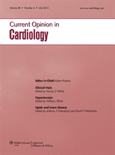
CURRENT OPINION IN CARDIOLOGY
Navigating the latest trends in cardiovascular medicine.CURRENT OPINION IN CARDIOLOGY, published by LIPPINCOTT WILLIAMS & WILKINS, is an esteemed journal in the field of cardiology that has been serving the academic community since 1988. With a robust focus on the latest developments and emerging trends in cardiovascular medicine, this journal aims to bridge the gap between clinical practice and research, offering critical insights and expert commentary. The journal is recognized in the medical community, achieving a 2023 Scopus rank of #148 out of 387 in its category, placing it in the 61st percentile. Although it operates under a subscription-based model, CURRENT OPINION IN CARDIOLOGY remains an essential resource for researchers, practitioners, and students seeking cutting-edge knowledge and advancements in cardiology. As a Q2 journal in the field, it continues to foster dialogue and provide a platform for disseminating impactful cardiovascular research, ultimately contributing to improved patient outcomes and informed clinical decisions.